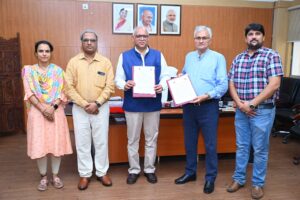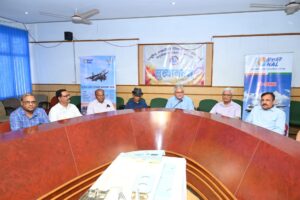
(Written by Mrs. Babli Chaturvedi, Hindi Translator, NITTTR Bhopal)
Special on the 75th Anniversary of Hindi as Rajbhasha of Bharat
Hindi Pakhwada: After the independence of India, there was a long discussion to adopt Hindi as the official language (Rajbhasha). Ultimately, the Constituent Assembly adopted Hindi as the official language of India on 14 September 1949.
Official language is a language recognized by law used to run various government or government functions of a country or state. This year on 14 September 2024, the Diamond Jubilee (75th Anniversary) of Hindi, as the Rajbhasha of Bharat, is being celebrated.
This day is a special occasion to recognize the role and importance of Hindi in the diversity of Indian languages. Hindi is one of the major languages of the Indian subcontinent and is also the official language of India.
It originated from Sanskrit and is written in Devanagari script. Hindi is recognized as an official language of India under Article 343 of the Indian Constitution. As the official language, “Hindi” has immense importance in Indian society and constitutional system.
This occasion is an appropriate time to reflect on the history, development and current status of Hindi language. On this occasion, various celebrations, programs, and discussions are organized in various central and state institutions under the “Hindi Pakhwada“, which focus on the richness of Hindi and its impact on society.
Hindi language is an important link of Indian culture, which also brings together cultural diversities. Hindi has assimilated words and ideas from many other languages and cultures over time. This linguistic richness has made it a multifaceted and inclusive language.
This journey of development of Hindi not only reflects the richness of the language, but also symbolizes the diversity and unity of Indian society. Hindi has made significant contributions to Indian literature, education and media.
Texts, poems, and novels written in Hindi have enriched Indian literature. Hindi has been a powerful medium for the dissemination of Indian culture and knowledge through education. Hindi’s significant contribution can also be seen in the Indian economic and social sector.
India is a country where diversity is amalgamated and Hindi is the pillar of its unity. It not only promotes dialogue and coordination among different parts of the country, but also strengthens India’s identity at the global level. Hindi language is now rising above the regional and national context and is making its identity in the international context. Hindi is also recognized as one of the seven languages of UNESCO.
14 September 2024 is the honour and celebration of the Diamond Jubilee of Hindi as the Rajbhasha of Bharat, i.e. the journey of 75 years. This day is an occasion to honour the prosperity, development, and contribution of Hindi.
Hindi, as the Rajbhasha of Bharat, is not only a language but a cultural heritage that encompasses various aspects of Indian life. It is an honour and pride for all of us to work in the official language Hindi, and we should also consider the future direction of Hindi and pledge to make it stronger as a progressive and inclusive language.






